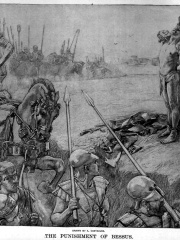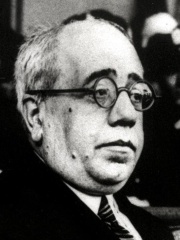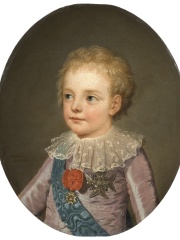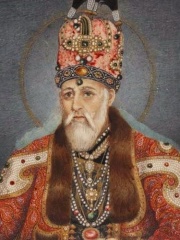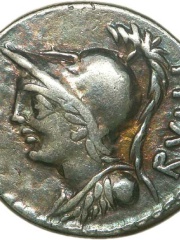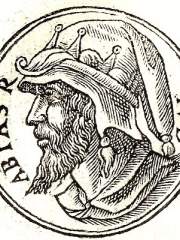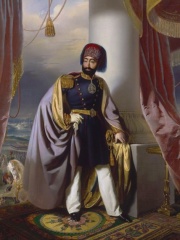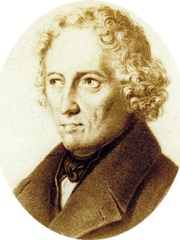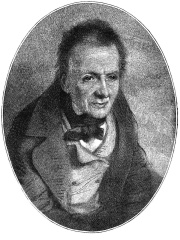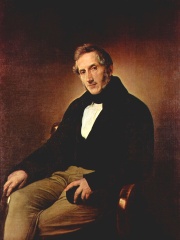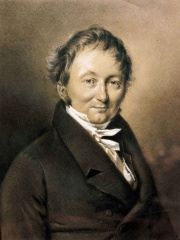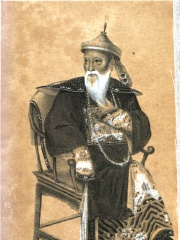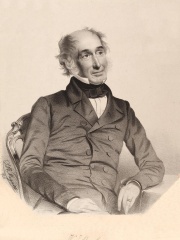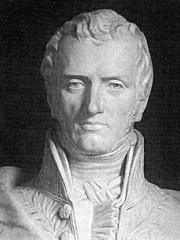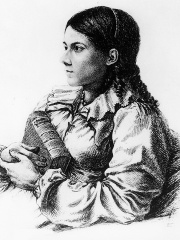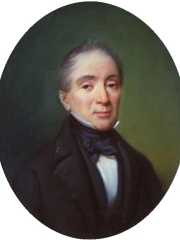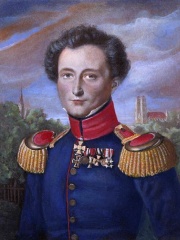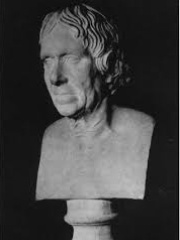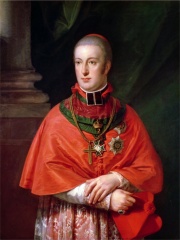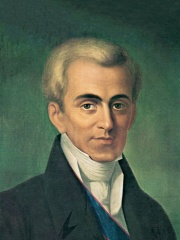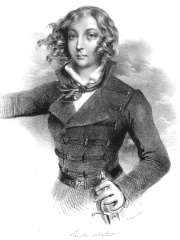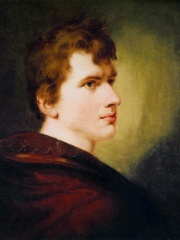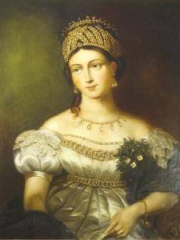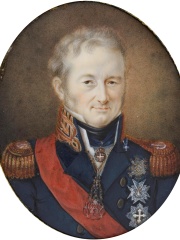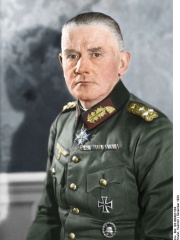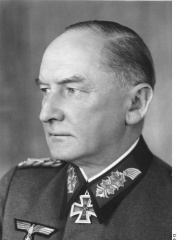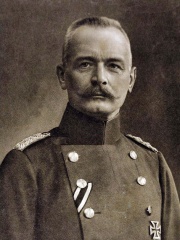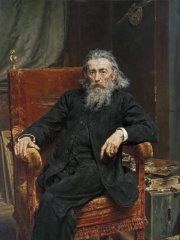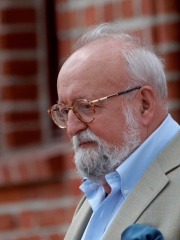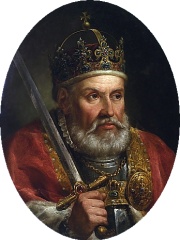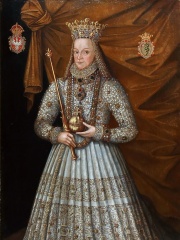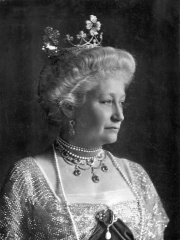POLITICIAN
Friedrich Wilhelm, Duke of Schleswig-Holstein-Sonderburg-Glücksburg
1785 - 1831
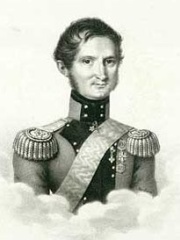
 Friedrich Wilhelm, Duke of Schleswig-Holstein-Sonderburg-Glücksburg
Friedrich Wilhelm, Duke of Schleswig-Holstein-Sonderburg-Glücksburg
Friedrich Wilhelm, Duke of Schleswig-Holstein-Sonderburg-Glücksburg (German: Friedrich Wilhelm Paul Leopold; Danish: Frederik Vilhelm Paul Leopold; 4 January 1785 – 17 February 1831) was a German-Danish prince and officer who was the Duke of Schleswig-Holstein-Sonderburg-Beck from 1816 to 1825, and the Duke of Schleswig-Holstein-Sonderburg-Glücksburg from 1825 to 1831. Friedrich Wilhelm is the progenitor of the House of Glücksburg. Friedrich Wilhelm was the only son of Friedrich Karl Ludwig, Duke of Schleswig-Holstein-Sonderburg-Beck and Countess Friederike of Schlieben, and was a member of the ducal house of Schleswig-Holstein-Sonderburg-Beck, a junior male branch of the House of Oldenburg. From 1804, he lived in his family's original home in Denmark-Norway, where he made a career as an officer of the Danish army during the Napoleonic Wars. Read more on Wikipedia
His biography is available in 23 different languages on Wikipedia. Friedrich Wilhelm, Duke of Schleswig-Holstein-Sonderburg-Glücksburg is the 1,561st most popular politician (up from 6,340th in 2024), the 81st most popular biography from Poland (up from 361st in 2019) and the 17th most popular Polish Politician.
Friedrich Wilhelm, Duke of Schleswig-Holstein-Sonderburg-Glücksburg is most famous for being the father of Queen Victoria.
Memorability Metrics
Page views of Friedrich Wilhelm, Duke of Schleswig-Holstein-Sonderburg-Glücksburg by language
Among POLITICIANS
Among politicians, Friedrich Wilhelm, Duke of Schleswig-Holstein-Sonderburg-Glücksburg ranks 1,561 out of 19,576. Before him are Bessus, Manuel Azaña, Emomali Rahmon, Louis Joseph, Dauphin of France, Akbar II, and Servilia. After him are Stephen III of Moldavia, Arnold Rüütel, Do-Aklin, Tiberius II Constantine, Abijah of Judah, and Joanna of Austria, Grand Duchess of Tuscany.
Most Popular Politicians in Wikipedia
Go to all RankingsBessus
400 BC - 329 BC
HPI: 73.62
Rank: 1,555
Manuel Azaña
1880 - 1940
HPI: 73.62
Rank: 1,556
Emomali Rahmon
1952 - Present
HPI: 73.62
Rank: 1,557
Louis Joseph, Dauphin of France
1781 - 1789
HPI: 73.62
Rank: 1,558
Akbar II
1760 - 1837
HPI: 73.61
Rank: 1,559
Servilia
104 BC - 42 BC
HPI: 73.61
Rank: 1,560
Friedrich Wilhelm, Duke of Schleswig-Holstein-Sonderburg-Glücksburg
1785 - 1831
HPI: 73.61
Rank: 1,561
Stephen III of Moldavia
1433 - 1504
HPI: 73.60
Rank: 1,562
Arnold Rüütel
1928 - 2024
HPI: 73.60
Rank: 1,563
Do-Aklin
1550 - 1700
HPI: 73.60
Rank: 1,564
Tiberius II Constantine
520 - 582
HPI: 73.60
Rank: 1,565
Abijah of Judah
1000 BC - 911 BC
HPI: 73.59
Rank: 1,566
Joanna of Austria, Grand Duchess of Tuscany
1547 - 1578
HPI: 73.59
Rank: 1,567
Contemporaries
Among people born in 1785, Friedrich Wilhelm, Duke of Schleswig-Holstein-Sonderburg-Glücksburg ranks 4. Before him are Louis XVII of France, Mahmud II, and Jacob Grimm. After him are Thomas De Quincey, Alessandro Manzoni, Karl Drais, Lin Zexu, William Jackson Hooker, Claude-Louis Navier, Bettina von Arnim, and Florestan I, Prince of Monaco. Among people deceased in 1831, Friedrich Wilhelm, Duke of Schleswig-Holstein-Sonderburg-Glücksburg ranks 7. Before him are Georg Wilhelm Friedrich Hegel, Carl von Clausewitz, James Monroe, Louis Jean Pierre Vieillot, Sophie Germain, and Napoléon Louis Bonaparte. After him are Archduke Rudolf of Austria, Ioannis Kapodistrias, Emilia Plater, Achim von Arnim, Princess Louise of Saxe-Gotha-Altenburg, and Charles Felix of Sardinia.
Others Born in 1785
Go to all RankingsLouis XVII of France
POLITICIAN
1785 - 1795
HPI: 83.26
Rank: 1
Mahmud II
POLITICIAN
1785 - 1839
HPI: 79.86
Rank: 2
Jacob Grimm
WRITER
1785 - 1863
HPI: 75.89
Rank: 3
Friedrich Wilhelm, Duke of Schleswig-Holstein-Sonderburg-Glücksburg
POLITICIAN
1785 - 1831
HPI: 73.61
Rank: 4
Thomas De Quincey
WRITER
1785 - 1859
HPI: 73.36
Rank: 5
Alessandro Manzoni
WRITER
1785 - 1873
HPI: 73.23
Rank: 6
Karl Drais
INVENTOR
1785 - 1851
HPI: 73.02
Rank: 7
Lin Zexu
POLITICIAN
1785 - 1850
HPI: 69.83
Rank: 8
William Jackson Hooker
BIOLOGIST
1785 - 1865
HPI: 69.36
Rank: 9
Claude-Louis Navier
PHYSICIST
1785 - 1836
HPI: 68.71
Rank: 10
Bettina von Arnim
WRITER
1785 - 1859
HPI: 68.15
Rank: 11
Florestan I, Prince of Monaco
POLITICIAN
1785 - 1856
HPI: 67.84
Rank: 12
Others Deceased in 1831
Go to all RankingsGeorg Wilhelm Friedrich Hegel
PHILOSOPHER
1770 - 1831
HPI: 88.27
Rank: 1
Carl von Clausewitz
PHILOSOPHER
1780 - 1831
HPI: 79.09
Rank: 2
James Monroe
POLITICIAN
1758 - 1831
HPI: 77.90
Rank: 3
Louis Jean Pierre Vieillot
BIOLOGIST
1748 - 1831
HPI: 75.90
Rank: 4
Sophie Germain
MATHEMATICIAN
1776 - 1831
HPI: 75.67
Rank: 5
Napoléon Louis Bonaparte
POLITICIAN
1804 - 1831
HPI: 75.32
Rank: 6
Friedrich Wilhelm, Duke of Schleswig-Holstein-Sonderburg-Glücksburg
POLITICIAN
1785 - 1831
HPI: 73.61
Rank: 7
Archduke Rudolf of Austria
RELIGIOUS FIGURE
1788 - 1831
HPI: 72.87
Rank: 8
Ioannis Kapodistrias
POLITICIAN
1776 - 1831
HPI: 71.62
Rank: 9
Emilia Plater
SOCIAL ACTIVIST
1806 - 1831
HPI: 71.60
Rank: 10
Achim von Arnim
WRITER
1781 - 1831
HPI: 69.71
Rank: 11
Princess Louise of Saxe-Gotha-Altenburg
POLITICIAN
1800 - 1831
HPI: 69.14
Rank: 12
Charles Felix of Sardinia
POLITICIAN
1765 - 1831
HPI: 68.97
Rank: 13
In Poland
Among people born in Poland, Friedrich Wilhelm, Duke of Schleswig-Holstein-Sonderburg-Glücksburg ranks 81 out of 1,694. Before him are Werner von Blomberg (1878), Ladislaus I of Hungary (1046), Erwin von Witzleben (1881), Benoit Mandelbrot (1924), Erich von Falkenhayn (1861), and Konrad Emil Bloch (1912). After him are Andrzej Sapkowski (1948), Horst Köhler (1943), Jan Matejko (1838), Krzysztof Penderecki (1933), Duchess Elisabeth of Württemberg (1767), and Johannes Hevelius (1611).
Others born in Poland
Go to all RankingsWerner von Blomberg
MILITARY PERSONNEL
1878 - 1946
HPI: 74.01
Rank: 75
Ladislaus I of Hungary
POLITICIAN
1046 - 1095
HPI: 73.83
Rank: 76
Erwin von Witzleben
MILITARY PERSONNEL
1881 - 1944
HPI: 73.76
Rank: 77
Benoit Mandelbrot
MATHEMATICIAN
1924 - 2010
HPI: 73.71
Rank: 78
Erich von Falkenhayn
MILITARY PERSONNEL
1861 - 1922
HPI: 73.67
Rank: 79
Konrad Emil Bloch
CHEMIST
1912 - 2000
HPI: 73.65
Rank: 80
Friedrich Wilhelm, Duke of Schleswig-Holstein-Sonderburg-Glücksburg
POLITICIAN
1785 - 1831
HPI: 73.61
Rank: 81
Andrzej Sapkowski
WRITER
1948 - Present
HPI: 73.44
Rank: 82
Horst Köhler
POLITICIAN
1943 - 2025
HPI: 73.42
Rank: 83
Jan Matejko
PAINTER
1838 - 1893
HPI: 73.20
Rank: 84
Krzysztof Penderecki
COMPOSER
1933 - 2020
HPI: 73.16
Rank: 85
Duchess Elisabeth of Württemberg
POLITICIAN
1767 - 1790
HPI: 73.09
Rank: 86
Johannes Hevelius
ASTRONOMER
1611 - 1687
HPI: 73.07
Rank: 87
Among POLITICIANS In Poland
Among politicians born in Poland, Friedrich Wilhelm, Duke of Schleswig-Holstein-Sonderburg-Glücksburg ranks 17. Before him are Sigismund I the Old (1467), Władysław III of Poland (1424), Zbigniew Brzezinski (1928), John II Casimir Vasa (1609), Yitzhak Shamir (1915), and Ladislaus I of Hungary (1046). After him are Horst Köhler (1943), Duchess Elisabeth of Württemberg (1767), Anna Jagiellon (1523), Augusta Victoria of Schleswig-Holstein (1858), Bolesław I the Brave (967), and Egon Krenz (1937).
Sigismund I the Old
1467 - 1548
HPI: 75.06
Rank: 11
Władysław III of Poland
1424 - 1444
HPI: 74.96
Rank: 12
Zbigniew Brzezinski
1928 - 2017
HPI: 74.64
Rank: 13
John II Casimir Vasa
1609 - 1672
HPI: 74.33
Rank: 14
Yitzhak Shamir
1915 - 2012
HPI: 74.15
Rank: 15
Ladislaus I of Hungary
1046 - 1095
HPI: 73.83
Rank: 16
Friedrich Wilhelm, Duke of Schleswig-Holstein-Sonderburg-Glücksburg
1785 - 1831
HPI: 73.61
Rank: 17
Horst Köhler
1943 - 2025
HPI: 73.42
Rank: 18
Duchess Elisabeth of Württemberg
1767 - 1790
HPI: 73.09
Rank: 19
Anna Jagiellon
1523 - 1596
HPI: 73.00
Rank: 20
Augusta Victoria of Schleswig-Holstein
1858 - 1921
HPI: 72.37
Rank: 21
Bolesław I the Brave
967 - 1025
HPI: 72.32
Rank: 22
Egon Krenz
1937 - Present
HPI: 72.28
Rank: 23
